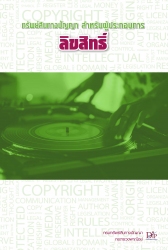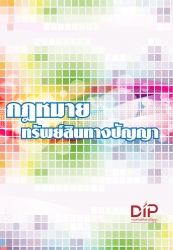
Author : กรมทรัพย์สินทางปัญญา
Publishing Date : Jan 12, 2018
รวมกฎหมาย พระราชบัญญัติทรัพย์สินทางปัญญาที่แก้ไขปรับปรุง (เลือกอ่านแบบหน้าเดี่ยว ตัวหน้าสือจะขยาย อ่านได้สะดวก)
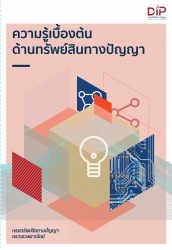
Author : กรมทรัพย์สินทางปัญญา
Publishing Date : Jan 15, 2018
ความรู้เบื้องต้นเกี่ยวกับทรัพย์สินทางปัญญาของไทย
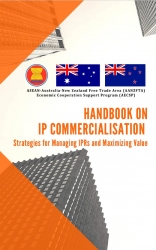
Author : The ASEAN Secretariat
Publishing Date : Mar 12, 2020
This Handbook is designed for business people of ASEAN Member States, Australia and New
Zealand.
In aid of understanding, some examples have been provided, but these are mere illustrations and do
not provide judgment and do not constitute commercial or legal advice. Views or conclusions may
have also been expressed but these should NOT be taken as legal or commercial advice. Any part of
the content of this publication (including images, graphics, trademarks or logos) is only intended for
informational and educational and educational purpose only.
The author and the ASEAN Secretariat have taken due diligence in the preparation of this
publication. However, they shall not be held liable for any omissions or inaccuracies in the content of
this publication. Neither the authors, the ASEAN Secretariat, Australian and New Zealand
Governments accept any liability for any claims, loss or expenses that may arise or arising from use
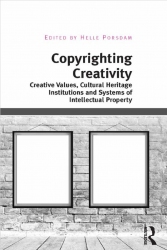
Author : Helle Porsdam
Publishing Date : Mar 09, 2016
What is the relationship between creativity, cultural heritage institutions and copyright? Who owns culture and cultural heritage? The digital age has expanded the horizon of creative possibilities for artists and cultural institutions - what is the impact on legal regimes that were constructed for an analogue world? What are the tensions between the safeguarding of cultural heritage and the dissemination of knowledge about culture? Inspired by a three year research project involving leading European universities, this book explores the relationship between copyright and intellectual property, creativity and innovation, and cultural heritage institutions. Its contributors are scholars from both the humanities and the social sciences - from cultural studies to law - as well as cultural practitioners and representatives from cultural heritage institutions. They all share an interest in the contribution of intellectual property to the role of cultural institutions in making culture accessible and encouraging new creativity.
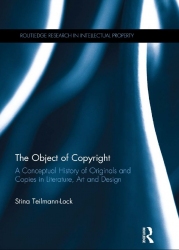
Author : Stina Teilmann-Lock
Publishing Date : Jul 24, 2015
Recent years have seen a number of pressing developments in copyright law: there has been an enormous increase in the range and type of work accorded protection; the concept of the ‘original work’ has entered into national copyright acts; and intangible entities are now entitled to protection by copyright. All these are consequences of legislative and technological developments that can be traced back over two centuries and more. the result. This book presents an interdisciplinary study of the growth of copyright law, largely based on archival research and on archival materials only recently made available online. The new history here articulated helps to explain why print is no longer today the sole or even the chief object of copyright protection.
Taking its key examples from British, French and Danish copyright law, the book begins by exploring how the earliest copyright laws emerged out of the technological understanding of a printed ‘copy,’ and out of the philosophical notions of originals and copies, tangibles and intangibles. Dr Teilmann-Lockgoes on to examine the concept of the ‘work’ as it develops both conceptually and legally, as the object of protection, and then explains how, in a curious consequence, 'the work' turns the ‘copy’ into the 'mere' material instantiation of the intangible 'original'. The book concludes by addressing the considerable and complicated problems now emerging in copyright law following the inclusion of design within the scope of its protection. In this field Danish law, striving to protect Danish design, has been setting the trend for over a hundred years.
In its examination of terminological exchanges between the diverse legal traditions and philosophical discourse, and in its thorough investigation of particular terms central to copyright legislation, this interdisciplinary book will be of great interest to scholars and students of copyright and intellectual property law; it also makes an important contribution to literary studies, legal history and cultural theory.
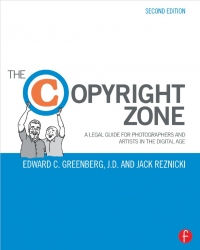
Author : Edward C. Greenberg, Jack Reznicki
Publishing Date : Feb 11, 2015
If you license or publish images, this guide is as indispensable as your camera. It provides specific information on the legal rights of photographers, illustrators, artists, covering intellectual property, copyright, and business concerns in an easy-to-read, accessible manner. The Copyright Zone, Second Edition covers: what is and isn’t copyrightable, copyright registration, fair use, model releases, contracts and invoices, pricing and negotiation, and much more.
Presented in a fun and easy to digest style, Jack Reznicki and Ed Greenberg, LLC help explain the need-to-know facts of the confusing world of legal jargon and technicalities through real world case studies, personal asides, and the clear writing style that has made their blog Thecopyrightzone.com and monthly column by the same name in Photoshop User magazine two industry favorites. The second edition of this well-reviewed text has almost doubled in size to ensure that every legal issue you need to know about as a photographer or artist is covered and enjoyable to learn!
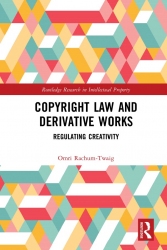
Author : Omri Rachum-Twaig
Publishing Date : Oct 26, 2018
Copyright law regulates creativity. It affects the way people create works of authorship ex-ante and affects the status of works of authorship significantly ex-post. But does copyright law really understand creativity? Should legal theories alone inform our regulation of the creative process?
This book views copyright law as a law of creativity. It asks whether copyright law understands authorship as other creativity studies fields do. It considers whether copyright law should incorporate non-legal theories, and if so, how it should be adjusted in their light. For this purpose, the book focuses on one of the many rights that copyright law regulates – the right to make a derivative work. A work is considered derivative when it is based on one or more preexisting works. Today, the owner of a work of authorship has the exclusive right to make derivative works based on her original work or to allow others to do so. The book suggests a new way to think about both the right, the tension, and copyright law at large. It proposes relying on non-legal fields like cognitive psychology and genre theories, and offers new legal-theoretical justifications for the right to make derivative works.
As the first book to consider the intersection between copyright law, creativity and derivative works, this will be a valuable resource for students, scholars, and practitioners interested in intellectual property and copyright law.
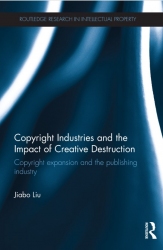
Author : Jiabo Liu
Publishing Date : Dec 12, 2012
This book examines the relationship between the legal extension of copyright duration as an enduring means of copyright protection and the growth of the UK book publishing industry as a typical creative industry reliant on copyright. The book draws on Schumpeter’s theory of creative destruction to analyse the implications of copyright law and policy on the book industry and illustrate the dynamic interaction between copyright expansion and the growth of the creative industries. The book reviews the historical development of UK copyright expansion and also considers copyright in the digital age. It explores the legal and economic concerns about copyright protection in general, and the expansion of copyright duration in particular. Using an innovative empirical method, it explores whether the expansion of the duration of copyright promotes or precludes the growth of book publishing industry. It goes on to suggest changes to copyright policy which would have an impact on the economics of innovation in the creative industries.
This book will be of particular interst to scholars and students of Intellectual Property Law.

Author : Simon Stokes
Publishing Date : Mar 06, 2015
The first edition of this book in 2002 was the first UK text to examine digital copyright together with related areas such as performers' rights, moral rights, database rights and competition law as a subject in its own right. Updated editions have included the UK implementation of the 2001 Information Society Directive and commentary on user-generated content and the development of Web 2.0 and beyond. Now in its fourth edition, the book has been updated and revised to take account of legal and policy developments in copyright law and related areas, in particular the increasing role of the Court of Justice of the European Union in shaping EU copyright law. The book helps put digital copyright law and policy into perspective and provides practical guidance for those creating or exploiting digital content or technology, whether in academia, the software, information, publishing and creative industries, and other areas of the economy. The focus is on the specifics of the law in this area together with practical aspects, including precedents and precedent checklists dealing with common digital copyright transactions. The latest edition has been expanded to include a discussion of Open Access, eBooks and app development and licensing. Both academics and practitioners will find the book an invaluable guide to this rapidly developing field of law.
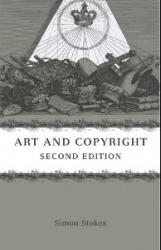
Author : Simon Stokes
Publishing Date : Sep 25, 2014
The intellectual property protection afforded to works of art is receiving increased attention by artists, museums, galleries, auction houses, publishers and their professional staff and legal advisors, as well as by those teaching or studying copyright and/or the law of cultural property.
Contemporary artists are pushing copyright law to extremes. The European Union is likely to soon formally adopt an artists’ resale right (droit de suite) directive. The recent adoption of the digital copyright directive will also further strengthen the rights of artists as regards the exploitation of their works via the Internet.
This is the first text to specifically examine in detail the intellectual property rights protecting artistic works and artists’ rights generally in the United Kingdom. The focus is on the UK but where appropriate other relevant jurisdictions are discussed. Recent European developments and the evolving UK case law in this area including the recent House of Lords’ decision in Designers Guild v Russell Williams are also addressed. The Internet and related intellectual property rights to copyright and moral rights are considered as well, including the law of passing off, breach of confidence, trade marks and domain name protection.
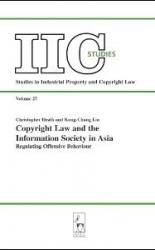
Author : Christopher Heath and Kung-Chung Liu (eds)
Publishing Date : Jul 25, 2017
The book takes a look at the six most important current topics arising from copyright law in the information society, and for each topic provides an in-depth introduction that compares the approaches taken in Europe and the US. Each topic is introduced by an expert, and the issues are then analysed in separate country reports representing nine Asian jurisdictions: China, Taiwan, Hong Kong, Japan, Korea, Singapore, Malaysia, Thailand and the Philippines.
The six topics are:
The Expansion of Copyright Law and its Social Justification: Introduction by Reto Hilty, Max Planck Institute, Munich
Internet Trade, Digital Works and Parallel Imports: Introduction by Christopher Heath, European Patent Office, Munich
The Collective Exercise of Copyrights: Introduction by Kung Chung Liu, Academia Sinica, Taiwan
The Law on Anti-Circumvention and Digital Rights Management: Introduction by Andy Sun, National Chenchi University, Taipei, Taiwan and Zhi Wei, Peking University, Beijing
Copyright Contracts, Public Policy and Antitrust: Introduction by Estelle Derclaye, Queen Mary University of London
Contributory and Vicarious Liability for Copyright Infringement: Introduction by Andy Sun, National Chenchi University, Taipei, Taiwan
123NextLast

